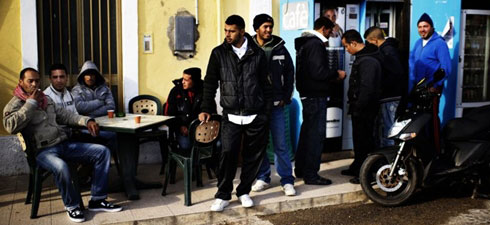Citing “burden sharing”, the Italian government is calling on Europe to take over dealing with the landings in Lampedusa, not just with regard to the costs of setting up patrols on our borders – Frontex is already doing that – but in offering hospitality to some of the refugees that have hit the shores of Italy. Rome has asked Budapest, which currently chairs the EU, to convene an extraordinary summit to establish the terms and conditions of this burden sharing that will cover both the accepting of refugees and the handling of asylum claims. We note in this regard that many refugees seem to intend to leave Italy. As a general rule, political refugees – like all immigrants – choose to concentrate in areas already occupied by a community of people speaking the same language they do and sharing the same nationality. The highest concentrations of Tunisians and citizens from north Africa are found today mainly in France and Spain.
The request from Italy, however, may risk being misunderstood by the public in large EU countries – starting with Germany – that are accustomed to accepting ten times that number of political refugees. Small countries like Norway, the Netherlands and Sweden will be even less sensitive, for in the last twenty years they have indeed accepted fifteen times more political asylum-seekers in proportion to their populations than Italy has.
That is why we must go beyond the present emergency and present Europe with consistent demands. First, a series of reforms on political asylum. The issue of political refugees cannot be addressed purely as a diplomatic issue, distinctly separated from larger issues of economic migration. The borders between these two types of migration inflows are very fragile: the processing of asylum claims by member states appears to respond to economic factors (such as unemployment or income per capita in the destination country) rather than to purely political factors, such as war or dictatorships in the countries of origin. In addition, a very serious error has been committed in Europe’s political asylum procedures, which continue to prevent political refugees from working and even from choosing what area of a country they wish to reside in.
The purpose is to prevent too many asylum-seekers. The result, however, is counterproductive, for several studies show that such restrictions do not deter abuse. Quite the contrary. Preventing persons granted asylum from working blocks the economic integration of immigrants and increases the burden on the indigenous taxpayer. Recent studies show that political refugees, forced to live on modest benefits in places they have not chosen to live in, get more easily caught up in petty crime than other citizens, including immigrants who have not won refugee status. It's an important lesson that we must take into account.
But we must also draw a lesson for the more general question of our immigration policies. If immigrants are "permitted to work," they are a great resource. And yet we want to complicate their lives foolishly (restrictions on their entry into the country, on the duration of their stay, on the renewal of residence permits, on changing places of employment, etc.). At least some of these refugees are thus likely easy to persuade that petty crime is doubtlessly more appealing than getting regular employment, which has become too complicated. Coordination of policies on asylum and migration should also be based on transparent criteria and shared among all member countries of the EU.
Today, several European countries are trying to introduce systems of points that can establish clearly defined priorities in allocating residence and work permits. These systems are often used to promote the immigration of persons who are skilled, educated and able to integrate more easily into a host country. Nothing prevents introducing humanitarian considerations into the legal system for ensuring priority of access to citizens of countries torn by civil wars, or from countries where the civilian population is regularly subject to violence, torture and arbitrary arrest. Joint border protection, asylum policies in harmony with those on economic migration and based on transparent principles – like the points system – can thus become the strengths of a European immigration policy.
Opinion
A following wave
"When people from Casablanca to Damascus, speak of 'wave' these days, they think of protests against oppression, corruption and poverty. When Europeans speak of 'wave', they think of the 5,000 refugees who landed in Lampedusa," writes Die Zeit. The weekly advises Europeans to overcome their fear of being swamped by migrants and not to view them through the sole prism of political asylum. With Germany, the Netherlands and France in the lead, we must stop migration issues being relegated to the distant southern borders of Europe, a policy inherited from the heavy migration from Eastern Europe at end of the 1980s and early 1990s.
Europe and its southern neighbors need to establish a genuine political movement between the two sides, the key being, work visas, university cooperation, harmonisation of professional training programmes and professional integration for migrants to return to their country. According to experts, it should only take two to three years to build such a partnership with Tunisia. But political will is lacking. Meanwhile, notes Die Zeit, the 5,000 so-called refugees are actually seeking employment and Europe is need of the workers and should should offer them a "dignified reception, to which everyone is entitled."
Was this article useful? If so we are delighted!
It is freely available because we believe that the right to free and independent information is essential for democracy. But this right is not guaranteed forever, and independence comes at a cost. We need your support in order to continue publishing independent, multilingual news for all Europeans.
Discover our subscription offers and their exclusive benefits and become a member of our community now!












